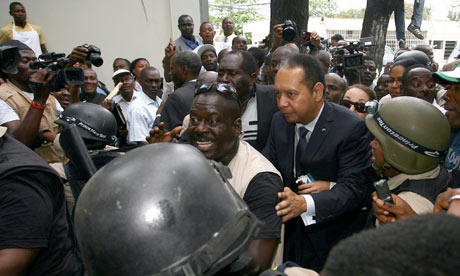
Jean-Claude "Baby Doc" Duvalier was charged with corruption, theft, misappropriation of funds and other alleged crimes committed during his 1971-1986 rule after the former Haitian dictator was hauled before a judge in Port-au Prince tonight.
"His fate is now in the hands of the investigating judge. We have brought charges against him," Port-au-Prince chief prosecutor, Aristidas Auguste, told Reuters.
The charges must now be investigated by the judge who will decide whether a judicial case should go ahead.
Dozens of officers, including some in riot gear, had whisked him earlier from his hotel past a jeering and cheering crowd and into a 4X4 with tinted windows – a scene which his regime's victims had long dreamed of. The 59-year-old, who was not handcuffed, appeared calm and did not say anything. He had been due to give a press conference to explain his return from 25 years in exile.
"Mr Duvalier is under the control of the judicial system. He's not free, he's going to my office," Auguste said. Crowds immediately thronged the courthouse in expectation of a historic hearing.
Amnesty International and Human Rights Watch, among others, have urged the authorities to prosecute the former dictator for jailing, torturing and murdering thousands of people during his 15-year rule.
His longtime companion, Veronique Roy, when asked whether Duvalier was being arrested, laughed and said nothing.
The scene evoked memories of 7 February 1986 when crowds danced in the streets after widespread revolts and international pressure led to his departure.
His Swiss banked fortune long used up in divorce and tax disputes, Duvalier returned to Haiti without warning on Sunday on a flight from Paris, saying he wanted to help. "I'm not here for politics. I'm here for the reconstruction of Haiti."
By mid-morning today it became clear he would need help himself. Police staked out the Karibe hotel, which he had used as a base to meet supporters, while Auguste and a judge, Gabriel Amboisse, questioned him in private.
By the time he emerged there was a crowd, split, like much of Haiti, over a man who terrorised with the Tonton Macoute militia but also symbolised a time when the economy at least partly functioned. Some jeered, others shouted "Free Duvalier! Free Duvalier!" and chased the 4X4.
A spokesman for the UN high commissioner for human rights said it should be easier to prosecute Duvalier in Haiti because it was where atrocities took place but that the judicial system was fragile.
It remained unclear why he returned and what impact it would have on the year-long post-quake crisis which has left a leadership vacuum and a country in ferment, with near daily street demonstrations by rival factions.
Published by The Guardian, Tuesday, January 18, 2011

